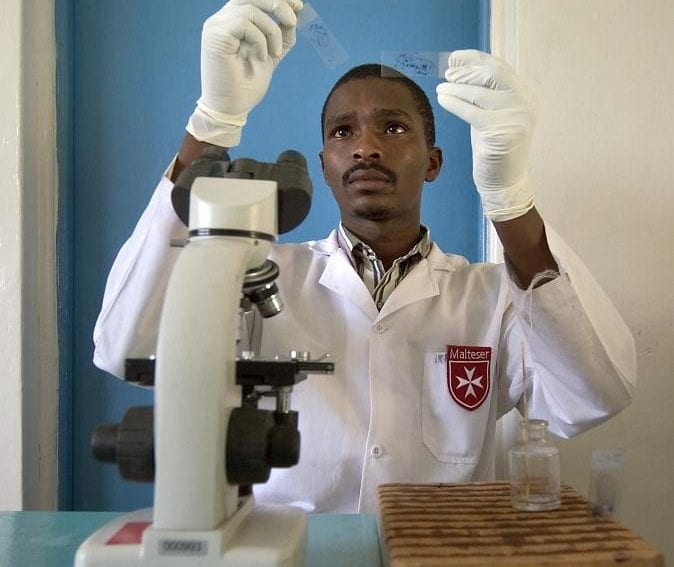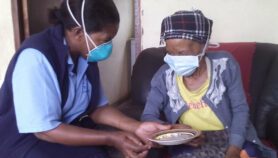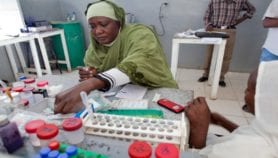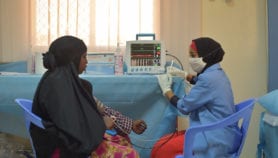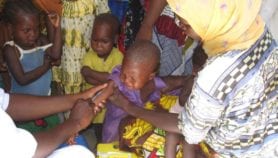By: Linda Nordling
Send to a friend
The details you provide on this page will not be used to send unsolicited email, and will not be sold to a 3rd party. See privacy policy.
TB remains an underfunded and under-researched health problem in many parts of Africa, writes Linda Nordling.
In more than 30 years since its discovery, HIV has become one of the biggest targets of global health funding. By contrast, tuberculosis (TB) is an ancient disease caused by a bacterium discovered in the 19th century.
Until recently, doctors thought they had TB under control—at least in the developed world. But HIV, which attacks the immune system, has combined with TB in terrible ways. In many parts of the world, new drug-resistant TB strains are a growing threat.
In South Africa, where co-infection of TB and HIV is common, researchers have found that the diseases seem to make each other worse—HIV progresses quicker, while TB is harder to cure. However, researchers still don’t know exactly why.
“Despite the interconnectedness between HIV and TB, investment in research and treatment of the latter has not caught up with that of HIV. As a result, TB researchers often call themselves the ‘poor cousins’ of their HIV counterparts”
Linda Nordling
Despite the interconnectedness between HIV and TB, investment in research and treatment of the latter has not caught up with that of HIV. As a result, TB researchers often call themselves the ‘poor cousins’ of their HIV counterparts.
New data published last month show that TB remains an underfunded and under-researched disease in most of Africa. [1] And that in places such as Nigeria, where its spread is growing while treatment and research activity remains low, risk becoming tomorrow’s TB hotbeds if things don’t change.
HIV’s poor cousin
In 2013, the global estimated spend on HIV and AIDS reached its highest-ever level of US$19.1 billion [2]. By contrast, research and development spend on TB that year was just over US$680 million.[3]
In African countries other than South Africa, the fight against TB is particularly under-resourced. A study published by scientists from Europe and Zambia in March this year found that patients who died in a hospital in Lusaka, Zambia, often were diagnosed with TB only after death, illustrating the gap in that country’s healthcare system. [4]
According to WHO’s global TB report in 2014, some African countries such as Uganda and Tanzania were on their way to reaching goals of halving TB prevalence and mortality by 2015, although Africa as a whole is not on track to meet these goals. [5]
A major problem is the growing TB burden in Africa’s most populous country, Nigeria. In 2013 Nigeria was the country with the third highest incidence—number of new cases—in the world, third only to China and India. New TB infections also seem to be growing in Nigeria, and the WHO estimates that over half a million TB cases were missed in the country in 2013 alone. [5]
Counting on TB
Africa’s poor research capacity and productivity in the field of TB was also explored recently. A scientometric study published by a group of German scientists last month found that while South Africa is one of the strongest countries in the field alongside the United States and the United Kingdom, the rest of Africa is poorly represented. [1]
The study, which looked at all TB research articles in Web of Science database produced between 1900 and 2012 found the United States as the most productive country with nearly 12,000 publications. The United Kingdom, India and France follow, with South Africa in fifth place with 1,840 papers.
“More Africans should also aim to lead research programmes, especially those that rely on data and studies in their own country.”
Linda Nordling
In terms of citations, which indicate how often other researchers have referred to the paper and thus helps gauge its impact, the United States and the United Kingdom were once more dominant, followed by France and South Africa in fourth place.
South Africa’s role is strengthened by its close academic links with the top two performers—the United States and the United Kingdom. The report identifies a triangle of super-collaboration between the three, giving South Africa a stronger position in the field than perhaps its research output suggests.
But the report also shows that the scientific community has a lot of interest in TB research coming from other African countries. When articles’ citations are divided by the total country output, two West African countries—Senegal and the Gambia—come third and fourth after Denmark and Latvia.
Guinea-Bissau and Zambia also come in the top ten of this measure, which excludes countries that have published less than 30 articles on TB. These articles are often collaborative, generally with researchers in countries where there are old colonial ties: France in the case of Senegal, and the United Kingdom in the case of the Gambia.
Few Africans lead
However in other measures, the continent’s performance is even worse. South Africa’s strong role is put in question by an article in January this year listing the world’s 100 top-cited TB research studies. [6]
Only one of the hundred had a South African first author (the lead author whose name appears first), while the vast majority of first authors were from Europe or the United States. This, the paper reports, is in spite of many of the articles describing actual research that was conducted in low-income countries.
More Africans should also aim to lead research programmes, especially those that rely on data and studies in their own country. Africans have already made a dent in HIV research; it is about time they do the same in the field of TB. Lives depend on it.
Journalist Linda Nordling, based in Cape Town, South Africa, specialises in African science policy, education and development. She was the founding editor of Research Africa and writes for SciDev.Net, Nature and others.
This article has been produced by SciDev.Net's Sub-Saharan Africa desk.
References
[1] David A.Groneberg and others Density equalizing mapping of the global tuberculosis research architecture (Tuberculosis, 22 May 2015)
[2] AVERT Funding for HIV and TB (AVERT, 2014)
[3] Treatment Action Group 2014 report on tuberculosis research funding trends, 2005–2013. 2nd edition (TAG, May 2015)
[4] Matthew Bates and others Burden of tuberculosis at post mortem in inpatients at a tertiary referral centre in sub-Saharan Africa: a prospective descriptive autopsy study (The Lancet Infectious Diseases, 10 March 2015)
[5] WHO Global tuberculosis report 2014 (WHO, 2014)
[6]. LM Chen and others The 100 top-cited tuberculosis research studies The International Journal of Tuberculosis and Lung Disease (1 June 2015)


